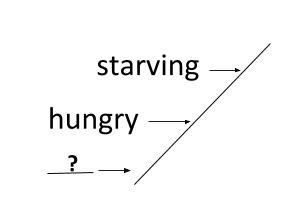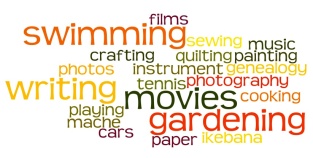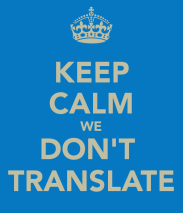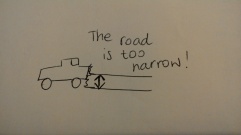 I’ve recently been offered a place on a DELTA course and I’m currently getting ready for it by reading a few of books on ELT methodology etc
I’ve recently been offered a place on a DELTA course and I’m currently getting ready for it by reading a few of books on ELT methodology etc
Every now and then, I feel I want to try out some of the ideas I come across in these books. The following lesson plan was designed after reading Working with Words by R. Gairns and S. Redman.
I delivered this lesson to a mixed ability class (most students were intermediate with the exception of one advanced and one upper-intermediate student), it went down quite well and my students said they enjoyed it!
Duration: 90 minutes;
Objective: learn new vocabulary using scales (this should help with retention);
Topic: eating and drinking;
Task 1
I told students a story which included some of the vocabulary I wanted to teach. This is just the beginning of the story:
The other day I was a bit peckish so I went into the kitchen but the only food I could find was bread. It wasn’t what I wanted to nibble on, I find plain bread to be a bit bland, I wanted something tasty…
I read the story twice. The second time I wrote the words below on the board:
peckish, to nibble on, plain, bland, tasty, rich, mild, generous, starving, to sip, to neck, to binge on, tiny, mild.
I told students to listen to the story and, after listening, look up the words on the board in a dictionary to find out what they meant. I suggested using the online Macmillan dictionary and told students to focus on the topic eating and drinking when choosing which meaning to focus on.
Task 2
In pairs,students have to write a short story using as many new words as they can.
Each pair gets to read their story to the rest of the class.
At this stage, I did not correct students’ mistakes.
Task 3
Students are given a handout with scales (like the one in the picture) that they have to complete with the words they have just learnt. To help them do this task, I gave them the following sentences to look at:
- I haven’t eaten anything all day, I’m starving!
- I’m not that hungry but I’m a bit peckish, I’d like to nibble on something (for example, crisps or nuts).
- He was reading a book while sipping wine.
- He got drunk after necking three shots of rom.
- I thought the meat was a bit bland, it needed more flavour.
- I often have plain rice when I don’t feel well.
- I’m so full, that dish was very rich!
- That restaurant is great! They give such generous portions.
Check with the whole class that students have place the words correctly on the scales.
Task 4
I took from students the handout with the examples and gave them the same handout but with gaps. Students have to fill in the gaps:
- I haven’t eaten anything all day, I’m___________!
- I’m not that hungry but I’m a bit ________, I’d like ___________ something (for example, crisps or nuts).
- He was reading a book while __________ wine.
- He got drunk after _________ three shots of rum.
- I thought the meat was a bit __________, it needed more flavour.
- I often have _______ rice when I don’t feel well.
- I’m so full, that dish was very__________!
- That restaurant is great! They give such ___________ portions.
Class check.
Task 5
In pairs, students go over the story they wrote at the beginning of the class to see whether they’ve made any mistakes.
Students might need some support at this stage. For instance, I pointed out that ‘to neck’ is transitive (as one pair had used it in an intransitive way) and I showed on the interactive whiteboard where this information can be found on the online Macmillan dictionary. This is an excellent chance to teach students how to best use a dictionary and what kind of information they should pay attention to when recording new vocabulary.
Task 6
Students work in pairs and ask and answer the questions below:
- When you feel peckish, what do you like to nibble on?
- When was the last time you felt starving, what did you binge on?
- How many shots of rum can you neck before you pass out*?
- How big are the portions in your favourite restaurant?
- Do you ever eat plain food?
The feedback I had from students at the end of the lesson was quite positive. They recognised that scales are a good way to understand and remember new vocabulary.
I also encouraged them to use scales to broaden their vocabulary and avoid overusing words like ‘very’, ‘not very’, ‘slowly’ etc like in the following examples:
starving to say very hungry
sipping to say drink slowly
What do you reckon? Could this be an interesting lesson for you to deliver? How could it be improved? Which tasks would you have done differently?
Any feedback would be much appreciated 🙂
Talk soon,
Deb
 I owe the idea of this blog post to my eighteen-month-old son: he was a bit restless yesterday afternoon so, to calm him down, I thought we’d have a bit of playtime on the bed. I started tickling him and he started giggling..
I owe the idea of this blog post to my eighteen-month-old son: he was a bit restless yesterday afternoon so, to calm him down, I thought we’d have a bit of playtime on the bed. I started tickling him and he started giggling.. I’ve recently been offered a place on a DELTA course and I’m currently getting ready for it by reading a few of books on ELT methodology etc
I’ve recently been offered a place on a DELTA course and I’m currently getting ready for it by reading a few of books on ELT methodology etc Students often ask me what they can do to improve their English. I usually answer that making a point of reading a newspaper article a day and / or watch telly or films in English is a good starting point. However, I know that sometimes you are not always up for it and you would rather do something more fun or that interests you more. So today’s tip on how to broaden your vocabulary and improve your listening skills is …take up a hobby or sport in English and stick to it!
Students often ask me what they can do to improve their English. I usually answer that making a point of reading a newspaper article a day and / or watch telly or films in English is a good starting point. However, I know that sometimes you are not always up for it and you would rather do something more fun or that interests you more. So today’s tip on how to broaden your vocabulary and improve your listening skills is …take up a hobby or sport in English and stick to it! Today’s post aims to help you increase the number of expressions you can use to talk about what you like and dislike. I’m going to ban the words ‘like’ and ‘dislike’ and present some alternatives that could be used instead.
Today’s post aims to help you increase the number of expressions you can use to talk about what you like and dislike. I’m going to ban the words ‘like’ and ‘dislike’ and present some alternatives that could be used instead. I always tell students that they shouldn’t translate into their native language. I say this mostly because in their study of the English language, learners are bound to bump into a word or phrase that, for a number of reasons (cultural, grammatical etc), they won’t be able to translate. Indeed, isn’t this but one of the many interesting aspects of learning a new language?
I always tell students that they shouldn’t translate into their native language. I say this mostly because in their study of the English language, learners are bound to bump into a word or phrase that, for a number of reasons (cultural, grammatical etc), they won’t be able to translate. Indeed, isn’t this but one of the many interesting aspects of learning a new language? raw it
raw it



